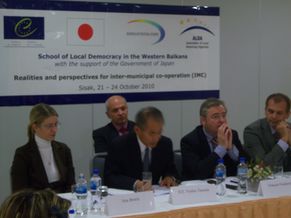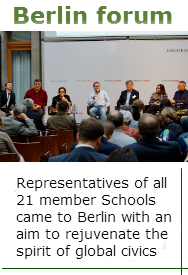Current events

Council of Europe Programme Adviser, Igor Gaon (former Mayor of the Municipality Douw-town/Center-Sarajevo) was the first speaker (22 October 2010). Mr Gaon gave an overview of inter-municipal co-operation (IMC) emphasizing that municipalities play a strategic role in determining the quality of life of citizens by providing public transportation, water supply, education, health services, etc. He also noted that many municipalities, due to a lack of capacity and resources, are not able to deliver all services to citizens. In these cases, territorial consolidation could be a solution in order to integrate several smaller municipalities into a bigger one. However, this step can have deep political consequences, therefore a good solution would be IMC. During the continuation of this session, several examples from the EU were discussed in which IMC has been successfully implemented: in Spain (8 000 municipalities), Italy (almost the same number of municipalities), Switzerland, France etc., while in Central and South East Europe, IMC is in the initial stages, and, particularly in the region of the West Balkans, very questionable.
The participants focussed particularly on the obstacles to establishing IMC, which in many cases had a personal instead of objective character, and where the problem of dialogue between the people and the higher level of political power is crucial. Through the discussion it became very clear that the problem for IMC in the Balkans region is not due to a lack of understanding regarding design or implementation. The problem is that the municipalities do not have sufficient autonomy and financial resources to enter into the project, thus major responsibility for implementation belongs to cantons, regions or to the State.
In the second part of the session, Ms Alba Dakoli Wilson (Director of the FLAG in Albania), spoke about the role of central and local authorities in promoting IMC, by considering the question: ‘What is the Governmental interest and how to motivate the central, regional but also local authorities to support IMC as a priority which will bring greatest benefit to citizens?’. Here participants agreed that one crucial aspect for implementation of IMC is to have good feasibility studies: to determine the size of the grant according to the financial capacity of the municipalities and number of citizens affected by the IMC. They insisted on transparency, good leadership, a culture of trust and dialogue as a precondition for satisfactory implementation of IMC programmes.
The third panellist of the day, Mr Slavisa Sucur, Member of Parliament of the Federation of Bosnia and Herzegovina, presented the legal and institutional aspects of IMC including financial arrangements and communication with the citizens concerning creation and implementation of IMC. An interesting discussion followed including: should partners (municipalities) in anticipation of IMC make an agreement based on previously prepared law, or an agreement based on a contract between two or more municipalities adopted by the municipality’s councils. For some participants, the Law on co-operation through the IMC can only be an obstacle to the implementation of the IMC, but everyone agreed that some regulatory mechanism is needed. Also, all emphasized the need for full citizen participation from the beginning to the end of IMC since everything is done for the good of the citizen.
Finally, the last speaker of the day, Mr Oriano Otocan, member of the regional Government in Istria (Croatia) charged for international co-operation and European integration, presented his own experiences concerning regional co-operation. In the report the speaker did not mention IMC and vertical co-operation between regional Government and municipalities. This was the best illustration of how the region is not interested in municipalities but looks instead towards Europe while disregarding its basic partners which should be the core of co-operation. In contrast, Ms Jadranka Beljan-Balaban, Provincial Secretary for local self-government and inter-municipal co-operation, Novi Sad (Vojvodina-Serbia), presented an excellent report on vertical (between regional Government and municipalities) and horizontal co-operation (IMC) in which she also mentioned co-operation between municipalities in Vojvodina and Hungary - a type of trans-border co-operation but also IMC by definition. The presentation was supported with considerable financial data and contracts between municipalities including data about education and cultural co-operation (a minority issue).
The following day (23 October 2010), began with workshops on IMC project design. The participants were divided into three groups and given the assignment of preparing a project which included all elements. The presentations of the projects demonstrated the success of the workshop and also its practicality. All elements discussed the day before were included and new questions appeared, but by the end of this session it was clear that we are headed in the right direction. The projects were well done and based on real needs of the Balkans region.
The afternoon session was dedicated to a presentation on how the Association of Local Democracy Agencies (ALDA) is contributing to development of IMC in the Balkans region. Ms Biljana Zasova, Senior Project Manager of ALDA, and Ms Paula Rauzan, Delegate of ALDA Sisak, described to the participants the strong link between the activities of ALDA and the development of municipalities including IMC in many different fields in order to strengthen, for example, the participation of women or minorities in the active life of the municipalities.
The afternoon session was organised in the City Hall of Sisak where Mr Tomislav Dovrenovic, Head of Department Municipality Sisak, discussed the political and economic situation in Sisak. The presentation well illustrated current life in Sisak and the problems and challenges of IMC. For the participants, it was good to see the development of one city after the war in Croatia, as well as the transition and co-operation in the IMC field including co-operation with the City of Zagreb which is only 55 km from Sisak. Participants also had the opportunity to visit Sisak, the implementation of the projects and the City of Sisak Museum.
The last session was dedicated to a presentation by Mr Klaus Schuman, former Director general of political affairs of the Council of Europe, on the Eurodistrict Strasbourg-Ortenau. After having referred to the historical process that led to the creation of the eurodistrict by a declaration of the two Heads of States of France and Germany, Mr Schuman explained the challenges that local authorities are today facing to implement concretely this new concept. The Eurodistrict is indeed a new concept that does not exist anywhere else, much more integrated in the minds of its promoteurs, than better known euro regions.
In order to move forward, the local authorities of France (Alsace) and Germany (Baden) have to solve constitutional and legal questions, to define joint institutions to run this new form of local and transborder authority, as well as to search for proper financial resources.
Despite these difficulties, Mr Schuman indicated that the political will exists on both side to overcome problems and find adequate solutions to build this new concept which a large majority of citizens on both sides of the Rhine are supporting.
This topic was showing how inter municipal cooperation can work also in transborder context and in fact boost joint initiatives of common interest. This was of course very relevant for the participants to the seminar, who had numerous questions on the opportunities to develop similar concepts in South East Europe, as factors of development as well as facilitators of reconciliation and restoration of dialogue.
At the end of this session, it was agreed that this topic deserves longer developments and participants have expressed the wish to be kept informed on the evolution of this project.
The seminar terminated with a evaluation discussion which revealed following:
The concept of a School of Local Democracy is relevant because it creates a unique space of discussion and exchange for members of local governments.
There is a real demand and need of mayors and members of local governments to meet even if numerous programmes are put in place by European and international organisations to promote local authorities. These programmes are often developed at level of central authorities and/or associations of local authorities and only rarely reach local leaders.
Invitation of experts of the region has been highly appreciated rather than international experts.
Participants would like to continue this experience and it was agreed, depending on the resources available, to allow half of the 2010 group of participants to join the group that will take part to this programme in 2011.
Among proposal for topics for 2011: leadership at local level and electoral process, inter-municipality and transborder cooperation, citizen’s participation, gender balance and local democracy.








